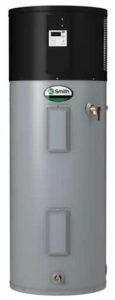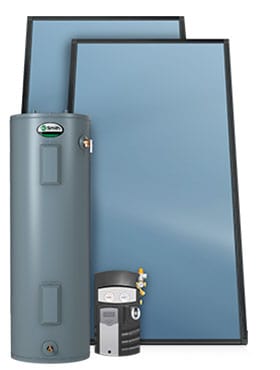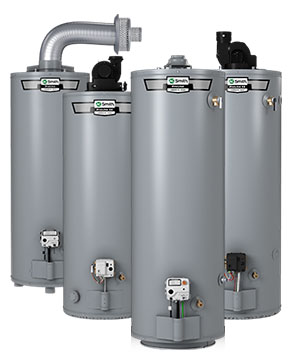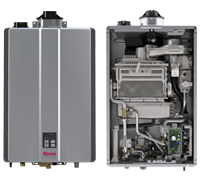
What is the Best Type of Water Heater to Use in Northern Virginia?
Despite 20% of the average household's expenses taken up by the cost of heating water, water heaters are usually ignored until they stop working. There are so many options, how do you know the best water heater to buy?
It's safe to say the reason why you're reading this today is that your water heater is either struggling and on the way out or has already left the building!
The good news is, water heaters have seriously improved since the last time you had to buy one. Newer models are even more energy-efficient than before – saving you money in the long run and working out to be more eco-friendly too.
There are so many different types of water heaters on the market now, you can choose the option that's best for your individual needs.
Environmentally-Friendly Water Heater Options
If your primary concern with your next water heater is being as eco-friendly as possible while still taking hot showers, your best bet is either a heat pump hot water tank or a solar power water heater.
 A.O Smith Heat Pump Hot Water Heater
A.O Smith Heat Pump Hot Water Heater
Heat Pump Hot Water Heaters – Hybrid Models
Heat pump water heaters are not like tank or tankless alternatives, they don't heat water directly. Instead, they work like your HVAC system's heat pump and capture heat from the air and transfer it to the water. They are called hybrid tanks because you can switch them to standard electric use when more water is needed.
What makes these models greener than traditional models is they use 65% less energy than gas, propane, or the standard electric tank.
Benefits of heat pump models
- You can save serious money on your electric bill
Problems with heat pump models
- The price of the unit is usually well over $3000
- Best used in areas where the temperatures don’t get too low
- They require much more space than other tank heaters: 7 feet of clearance from floor to ceiling. You’ll also need 1,000 cubic feet of uncooled space to capture enough heat from the air as well as a nearby drain to discharge the condensate.
 A.O Smith Cirrex® Solar System
A.O Smith Cirrex® Solar System
Hot Water Heater
Solar Power Water Heaters
No doubt you've seen roof-mounted solar cells around your neighborhood. These work by absorbing the sun’s heat, then transferring it to an antifreeze-like fluid in a closed-loop system that runs to the water tank.
Solar-powered water heaters work great in sunny climates and can deliver serious savings in summer. This is the major drawback to installing a solar water heater system in Northern Virginia! For cloudy days, a backup system needs to kick in to make up the difference in solar power and the house's needs.
If you're keen on installing solar panels for your home, there are both local and federal rebates available.
Benefits of solar power water heaters
- Your energy savings can be huge during the summer
- The most eco-friendly heating option there is
Problems with solar power water heaters
- It will take between 10 and 30 years to recoup the costs of buying and installing solar panels
- Best used in sunny areas
The Most Popular Water Heaters in the US
The vast majority of homes in the US use either a conventional storage-tank water heater or an on-demand tankless water heater. Both of these options are a great choice for homes in Northern Virginia.
 A.O Smith ProLine®
A.O Smith ProLine®
Hot Water Heater
Conventional Storage Tank Water Heaters
Storage tanks are the most common type of water heater and for good reason too. Almost half of the homes across the US use gas-heated storage tank heaters. There are also electric storage water heaters too.
Natural gas water heaters usually use less energy and cost less to run (by about half) than electric water heaters, although gas models do tend to cost more at the time of purchase.
As the name suggests, these consist of an insulated tank where water is heated and stored until needed then emerges from a pipe on top of the water heater.
There is also a temperature and pressure-relief valve, which opens if either goes over a preset level.
The storage tank system works day and night to maintain the temperature you set. It's similar to a thermostat on your HVAC system.
When your water temperature drops below the preset level, the heater turns on until the water reaches the target temperature.
Typically lasting anywhere between 9 and 13 years, you can further its lifespan if you drain the tank down and clean the sediment out of it… (you can delegate the job to our water heater maintenance team).
Benefits of Storage Tank Water Heaters
- The initial cost to buy and install is relatively low
- Easy to install and maintain
Problems with Storage Tank Water Heaters
- If you need a lot of hot water in a short amount of time, the system can struggle to heat enough water quick enough
 Rinnai® Tankless Hot Water Heaters
Rinnai® Tankless Hot Water Heaters
On-Demand Tankless Water Heaters
Tankless water heaters use flame-heated coils to heat the water as you need it, so there's no hot water sitting in a tank.
They’re more energy-efficient than a storage tank, but they can only provide a limited flow of hot water per minute – about 3.5 gallons.
A great choice for those living on their own or people who typically aren’t using water for more than one use at a time (like having a shower while doing the laundry).
The upside is, as long as you're not using it for more than one appliance at a time, you can have all the hot water you need! If you have the budget, some households install multiple tankless heaters and dedicate them to a specific appliance to combat the issue.
Tankless water heaters are best for homes that use natural gas to heat their water.
Benefits of Tankless Water Heaters
- Saves money on the utility bills
- Provides hot water quickly
- A natural gas system is around $800
Problems with Tankless Water Heaters
- A low GPM flow means limiting water to multiple appliances at one time
- Tankless water heaters need to be cleaned annually
